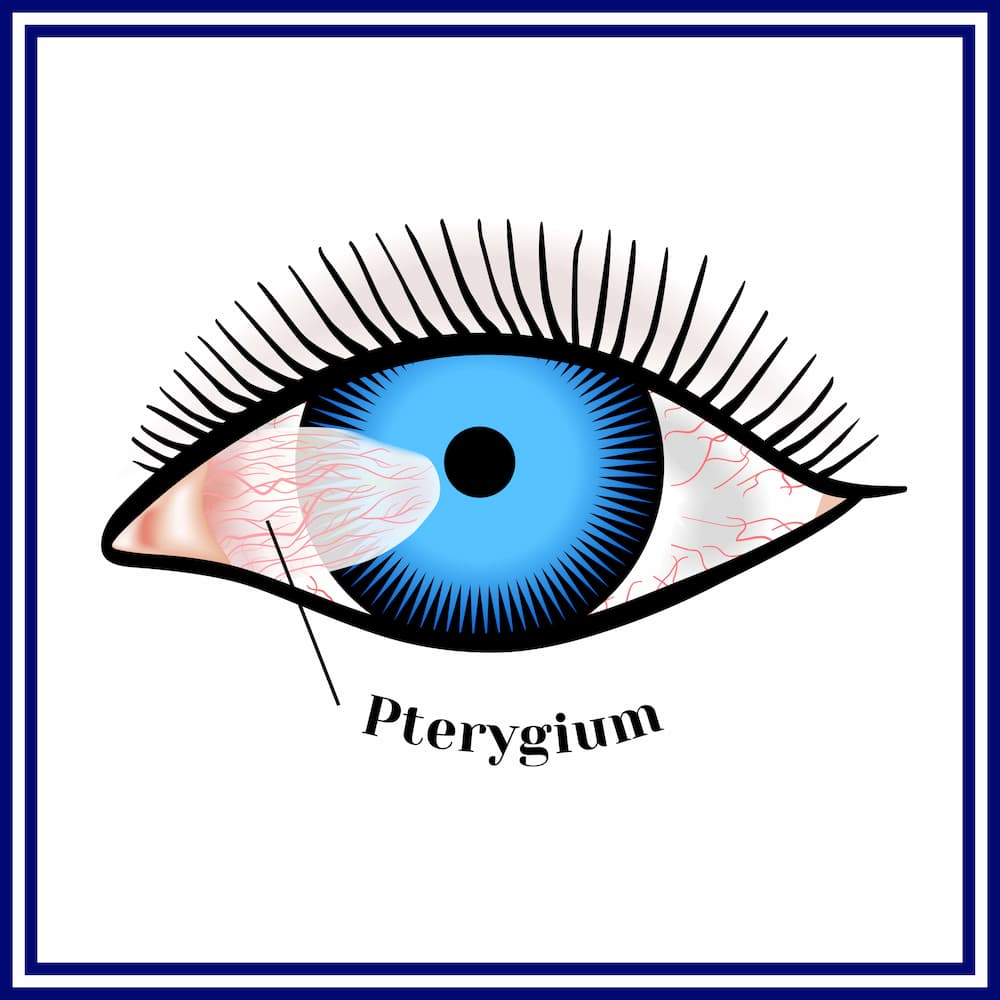Pterygium or surfers eye is a condition where tissue grows over your eye. The leading cause is exposure to UV light and spending a lot of time outdoors.
Pterygium is a treatable condition that responds well to specific treatments. The eye doctors at Nevada Eye Physicians are experts at treating pterygium.

What is Pterygium?
Pterygium is a growth on the clear covering of the white of your eye called the conjunctiva. It is a growth of fleshy tissue that contains blood vessels.
Usually, pterygia begin in the corner of your eye near your nose and grow inward toward your cornea. They can also originate from the corner of your eye, but that is less common.
Most pterygia remain small and don’t cause pain or vision problems. But, they can grow larger and affect your vision.
If it does not grow onto or into your cornea it is called a pinguecula. If a pinguecula grows over your cornea then it is a pterygium.
If a pterygium interferes with your vision or causes discomfort and pain, it may be necessary to remove it with surgery.
What Causes Pterygium?
The exact cause of pterygium is unknown. But they develop more the closer you are to the equator and the more time you spend outdoors in the elements.
They are especially common in individuals with a history of increased UV exposure. People who spend a lot of time outside without eye protection tend to develop pterygia most.
Surfers and anglers tend to get them a lot because of how much UV exposure they get while around the water. Other common causes of pterygia are dry climates, wind, and dust.
Because pterygia are usually caused by outdoor environmental factors people who primarily work outdoors are also at higher risk of developing them.
There are ways to prevent a pterygium from growing in your eye. The easiest way is to protect your eyes from UV rays and debris like dust and sand when you’re outside.
What Are The Symptoms of Pterygium?

The first sign of pterygium won’t be any symptoms but rather the tissue itself. It grows in a triangular or kite shape across your eye from one of the corners.
Most pterygia don’t cause any symptoms, but if they do, symptoms include:
- Redness and swelling of the conjunctiva, mainly while the pterygium grows
- A yellow spot or bump on the white of your eye
- Dry, itchy, burning eyes
- Feeling like sand or grit is stuck in your eye
- Blurry vision
Also, a pterygium can grow in front of your cornea and pupil, which interferes with your vision. Usually, though, they are asymptomatic.
How do You Treat Pterygium?
Often, pterygium does not require treatment. But you may need to treat yours if your eyes are uncomfortable or it is affecting your vision.
The most common cause for pterygium removal is aesthetic. Many people don’t like how they look.
Irritation, tears, and foreign sensation in the eye from pterygium can respond well to medicine. Medications include vasoconstrictor drops, lubricating eye drops, and ointments.
Discomfort, redness, and swelling are usually treated with these lubricating or steroid eye drops. A more extreme treatment is surgical removal.
The most effective type of pterygium removal procedure is removal with either an autograft or amniograft. That means your surgeon removes the tissue from your eye and covers the area with a piece of healthy conjunctival tissue. This procedural method has the lowest risk of a pterygium returning after removal.
Eye drops are the most conservative form of treatment, and removal is the most extreme. Your eye doctor will help you determine the best way to treat your pterygium based on your situation.
Can You Prevent Pterygium?
The best thing you can do to prevent pterygium is to wear sunglasses and protect your eyes from irritants. The most common irritants that cause pterygium include:
- Chemical fumes from household or industrial cleaners
- Dirt
- Dust
- Sand
- Extreme heat
- Fumes
- Smoke
Constant or frequent long-term exposure to these irritants is what is believed to cause pinguecula and pterygia.
If you notice your eyes getting dry, use artificial tears to ensure they stay moisturized. Doing so should keep your eyes clear from tissue growth.
Do you have a pterygium that you think needs examination? Schedule an appointment at Nevada Eye Physicians in Las Vegas, NV, to ensure your eyes remain healthy and comfortable!



